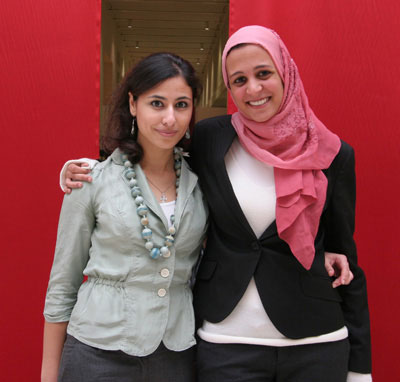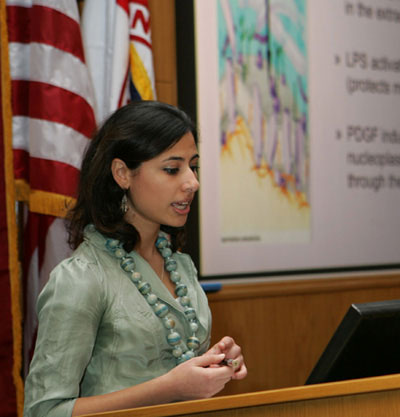Science on the cusp
Egyptian medical students work with top researchers in US

Egyptian medical students Nancy Zaki and Amira El Sherif
worked with top researchers in the US over the summer.
Biomedical research is an adventure – a chance to investigate unknowns in science, to find solutions to unanswered questions and translate them into new therapies for disease.
It requires precision, time, patience and the flexibility to try new approaches when one experiment proves inconclusive.
These insights into research on the cusp were offered by Egyptian medical students at Weill Cornell Medical College in Qatar (WCMC-Q) during the Third Annual Medical Student Research Forum.
Nancy Zaki and Amira El Sherif described projects they worked on at Weill Cornell Medical College in New York City and its affiliate, the Rockefeller University, during the past summer, when they joined the labs of top investigators in the fields of breast cancer and idiopathic pulmonary fibrosis (IPF).
The research experience enabled them to practice a range of lab techniques, join in the daily activities of the teams – and enjoy life in Manhattan, where the Medical College is located.
Although a rarity for students in the Middle East, exposure to research is an important part of the learning experience at Cornell University, and its Medical Colleges in New York City and Doha, Qatar.
“It’s important to have this kind of chance,” said Nancy Zaki, who is from Cairo. “I want to be a clinician in the future, and I knew that before going to the US to do research; I went because I wanted the experience itself, to learn new methods and meet new people in the field.”
Learning the techniques Zaki’s research in the field of breast cancer – the most prevalent cancer among women in Egypt – focused on an enzyme (sphingosine kinase) that has been shown to be over-expressed in colon and ovarian cancer.
Hypothesizing that it could play a part in the development of breast cancer, she homed in on the enzyme’s role in the proliferation of cells in a primary tumor, and in paving the way for the cancer to spread (metastasis).
Although her results were not conclusive, Zaki said she gained significantly from her work at the bench, designing primers, doing RT-PCR*, and learning the technique for extracting RNA.
For Amira El Sherif, an Alexandrian who graduated in biology from the American University in Cairo, this was her second contribution to WCMC-Q’s Research Forum. Last year, she presented a poster of her undergraduate research, an ecological study carried out in the Red Sea area.

Exposure to research is important, says medical student
Nancy Zaki, pictured giving her oral presentation.
While there are some “constants” in research methodologies, her project this year had a distinctly clinical emphasis, she noted.
Throwing light on a mystery The curious thing about El Sherif’s chosen subject of investigation (IPF) is how little is known about it. Investigating a disease of unknown origin, with no effective treatment, was a journey into new territory.
The team set out to discover if what has been learned about a different condition that affects the heart could apply to this fibrosis of the lung.
They focused attention on mast cells, which release renin in reaction to inflammation.
“The lab team took what they got in 2004 about mast cells and the heart, and extrapolated it to the lung,” she explained. “Since they showed that mast calls release renin in the heart, we now think that they might be releasing renin in the lung as well. That could play a role in IPF.”
Although the project is in its early stages, her research achieved “qualitatively encouraging results.” She came away with the satisfaction of having learned a lot about biomedical research and made a contribution to research that could help patients in the future.
*RT-PCR: reverse transcriptase polymerase chain reaction, a method for obtaining DNA from RNA, and amplifying the sample.
